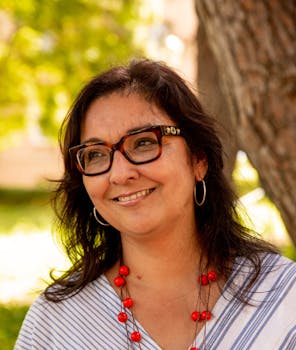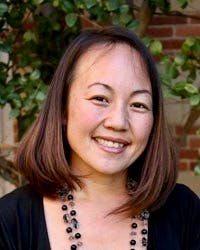UCLA @ AERA 24 - A Focus on Teachers and Teaching
UCLA Scholars will spread out across AERA 24 in Philadelphia to share what they are learning about teachers and teaching

Teaching is central to the mission and work of UCLA. The university was founded as a teacher training school, and today the UCLA School of Education and Information Studies Teacher Education Program prepares talented, dedicated teachers to teach in urban schools in the Los Angeles area. The school is also deeply engaged in research and actions that seek to understand, inform and improve teacher development, teaching practice, and the policies that shape and strengthen the teaching profession.
In April, in events ranging from poster sessions on teacher collaboration to symposia on teacher preparation and placement, UCLA students, research staff, and faculty will spread out across AERA 24 in Philadelphia to share what they are learning about teachers and teaching and their ideas for improving teacher development and practice.
One important symposium, “Pedagogies for Ethnic Studies Teacher Education,” takes place Saturday, April 13 at 11.25 at the Philadelphia Convention Center. Chaired by UCLA Teacher Education Program Director Emma Hipolito, the symposium brings together UCLA scholars to share their research, experiences, and thinking about the development of pedagogical approaches that support the preparation of K-12 Ethnic Studies teachers amid tensions that have emerged throughout the process of teaching teachers how to teach ethnic studies.

“California Assembly Bill 101 establishes Ethnic Studies as a requirement for graduation and by the 2025-26 school year all high schools in California have to offer ethnic studies instruction. The state needs Ethnic Studies teachers,” says Hipolito. “We are committed to helping to meet that need and we want the most qualified, the best prepared, the most committed people to do that work. I think this session speaks to what TEP has been doing to make that happen. Hopefully, it will inspire others to think about what they're doing to support ethnic studies teachers.”
In the symposium, UCLA Teacher Education Program Advisors Darlene Lee and Eduardo Lopez share their research, “Ethnic Studies Teacher Candidate Core Competencies: What should beginning Ethnic Studies teachers understand and be able to know and do?” Lee and Lopez will share and discuss the development of the UCLA TEP Ethnic Studies Teacher Education Pathway and how TEP defines Ethnic Studies pedagogy and its core pedagogical and content knowledge.
“Our work is really for teachers. We started this program nine years ago and are very focused on preparing teachers for teaching Ethnic Studies and on learning about Ethnic Studies teacher preparation,” says UCLA Teacher Education Program Advisor Darlene Lee. “A very large and collaborative collective of folks have done a lot of thinking and teaching and learning and leading in this area. It’s not just one person, we are contributing to a broader movement of change.

“I think we've learned a lot about the needs of teachers, and what it means to what it means to prepare them in ways that help sustain them in the profession. I hope what we have learned over these nine years might be interesting and informative. One thing in particular is the importance of collaboration and relationships, I think this pathway necessitates cultivating relationships with others working in the field of Ethnic Studies so that we can think together about what we're doing.”
Lee also joins Urban Schooling graduate students Julieta Rico and Keara Williams to discuss their research on Ethnic Studies teacher field supervision, highlighting the role field supervision plays in supporting ethnic studies teachers in navigating competing perspectives and demands while making concrete decisions about what and how to teach. Urban Schooling Doctoral candidates Mariana E. Ramirez, Sara Jasmin Diaz-Montejano, and alumni Eduardo F. Lopez also present, “Ethnic Studies Pedagogy Development: Understanding How Beginning ES Teachers Apply Their Theoretical and Political Commitments.”
A highlight of the symposium is a presentation of research, “Lands/Waters-Based Pedagogies in Ethnic Studies Teacher Education.” UCLA Ed&IS faculty members Ananda Marin and Lorena Guillen join with students AnMarie Ramona Mendoza and Sara Jasmin Diaz-Montejano and colleagues at other institutions to discuss their research on the development of “Teaching and Learning in Tovaangar,” a collaborative effort that brought together faculty, graduate students, and Tongva and other local Indigenous educators to create a learning community that develops lands/waters-based approaches in teacher preparation. The study portrays their understanding of how faculty can leverage courses to support pre-service teachers in the development of pedagogical practices grounded in lands/waters-based pedagogies within a K 12 Ethnic Studies pathway. Their analyses reveal restraints to enacting lands/waters-based pedagogies and highlight pedagogical opportunities for deepening understandings of lands/waters-based approaches to K-12 Ethnic Studies.
Scholars from UCLA are presenting a range of additional sessions focused on teachers and teaching over the 4-day AERA meeting. A partial list of highlights includes:
“Teachers' Reported Characterizations and Supports for Students in Mathematics.”
Thursday, April 11, 10:50 am. Pennsylvania Convention Center, L 100, Room 103B
Knowing what students know mathematically is seen as an essential component of productively engaging students in learning mathematics and leads to more effective teaching practices. UCLA Education Professor Megan Franke and doctoral student Christine Roberts share research investigating whether teachers in kindergarten through second grade characterized their students mathematically in ways that would enable them to take up the details of their students’ mathematical ideas. Their findings show an increase across both districts in non-math characterizations in higher grade levels, as well as more general practices being utilized, such as ability grouping, to support students.
“TEP (Teacher Education Program) Deserts: The Link Between Teacher Shortages and the Location of Teacher Education Programs”
Sat, April 13, 11:25 am, Pennsylvania Convention Center, Floor: Level 100, Room 104A
UCLA CTS California Educator Diversity Project director Kai Mathews, CTS graduate student researchers Cathy Balfe and Hui Huang, and doctoral researcher Erika Yagi discuss their research on teacher education deserts and the implications for the development of the teacher workforce. The research finds the location of teacher education programs impacts educator workforce patterns across the state and suggests policymakers and educators look beyond recruitment and retention to the physical pipeline structures that may be impacting efforts to stabilize the profession.
“California Teacher Preparation and Placement Data: What Do We Know? What Can We Learn?:
Thu, April 11, 12:40 pm, Pennsylvania Convention Center, Floor: Level 100, Room 104A
California’s data system detailing its teaching workforce lags behind that of other states. UCLA CRESST research scientist Christine Ong describes California’s Teacher Education Research and Improvement Network (CTERIN) large-scale teacher-level data set, and shares findings on new teacher demographics, differences in entry into the teacher pipeline, and attrition rates of those entering the profession with emergency/waiver permits. Ong will also discuss how these findings along with qualitative research may support efforts in humanizing teacher work.
“The What and How of Supporting Teachers: Experienced Teacher-Facilitator Perspectives to Teach Algorithmic Injustices Within High School Computing Classrooms.”
Thu, April 11, 4:20 tpm, Pennsylvania Convention Center, Floor: Level 100, Room 118B
Gail Chapman, UCLA Director of National Outreach - Exploring Computer Science, shares preliminary analysis of research exploring the needs of experienced teachers new to teaching critical Artificial Intelligence Markup Language (AIML) within introductory high school computing classrooms, and teacher views on how new teachers can be better supported to meet those needs.
For information about additional UCLA sessions at AERA 24 search the AERA meeting website